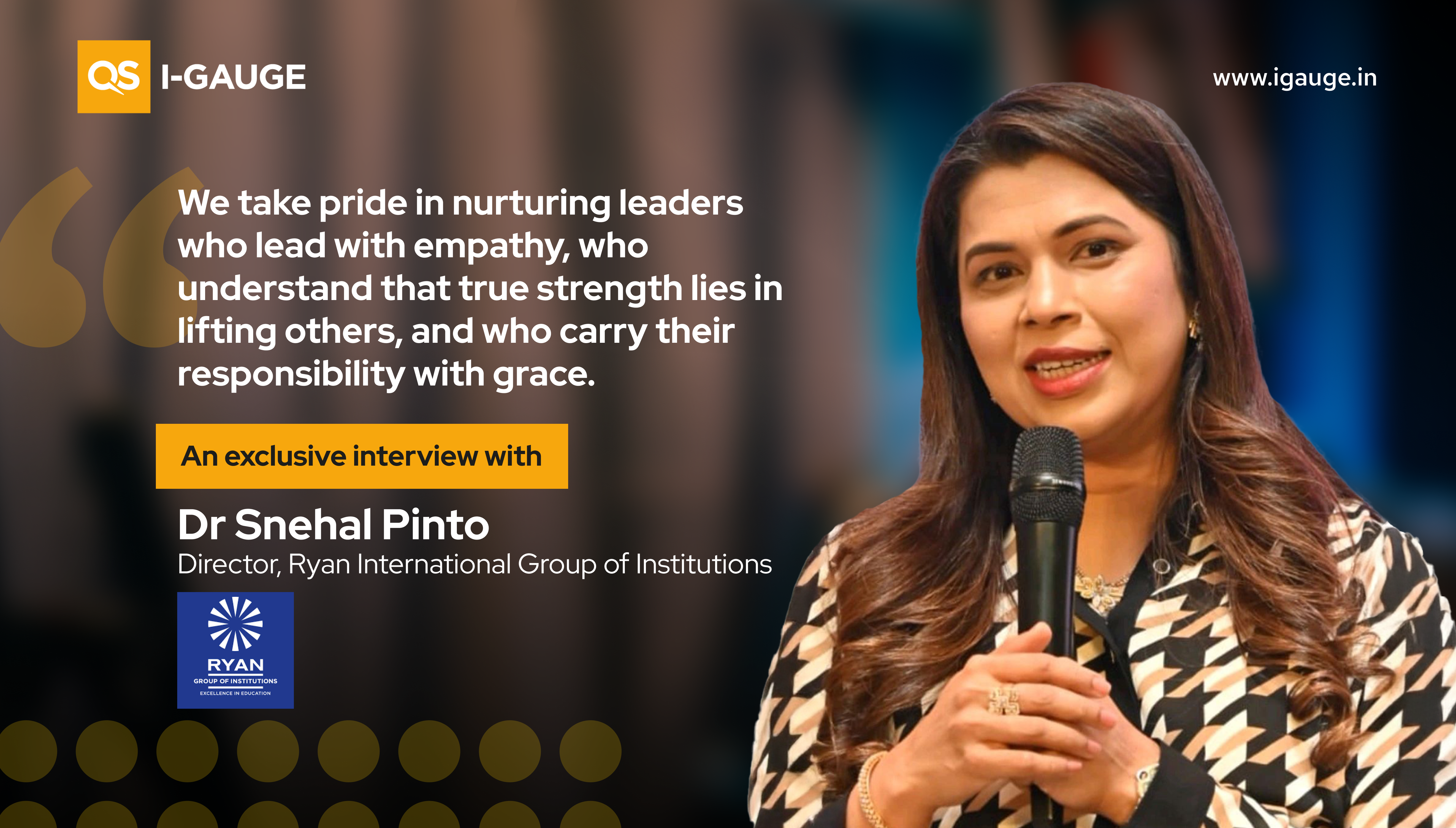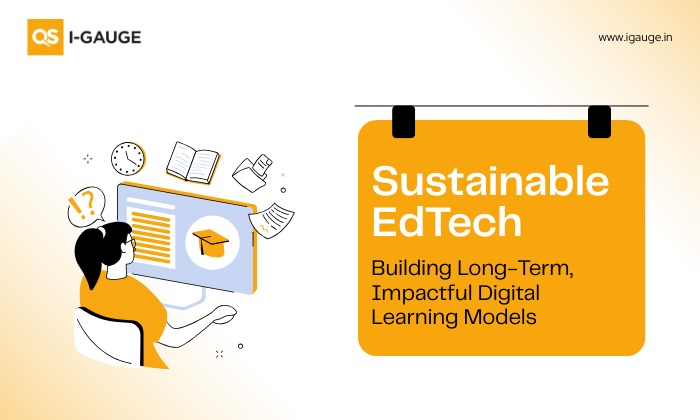
An exclusive interview with Dr Snehal Pinto, Director, Ryan Group of Institutions
Written By Dr Himanshu Pawar, Market Research Analyst
"You be the Gospel that everyone sees”
- St Francis of Assisi
The Ryan Group of Institutions, built on a bedrock principle, ‘making quality education accessible to all’, is not only a collective of over 135 national and international schools, but it’s also a living embodiment of the vision of its founding chairman, Dr Augustine F. Pinto and its managing director, Dr Madam Grace Pinto. The group adopts an ingenious KASSM approach for student development, an acronym for attaining knowledge, developing the right attitude, learning the right skills, and cultivating social and moral values. They wholeheartedly believe in nurturing students with a higher sense of enlightenment, focusing on the all-around development of a child and contributing their part to making the world a better place.
In a thought-provoking interview-discussion session with QS I-GAUGE, Dr Snehal Pinto, the Director of Ryan Group of Institutions, brings to the fore key initiatives and innovative leadership philosophy behind her student-centric approach to school education. The session encompassed themes such as senior management's leadership styles, student experiences and support, and explored dimensions of student-centric leadership, along with personal anecdotes from Dr Pinto's rich experiences.
Elucidating on the role of her father in her life and his leadership style, Dr Pinto said, “He is a man of extraordinary vision, his leadership has not only been inspiring and transformational for me but also for thousands of students, staff members and families across the nation and beyond. What makes his vision enduring is the fact that it's anchored in faith, and he doesn’t see education as a job but rather as a divine mandate and a calling. He sees his mission as not only uplifting individuals and generating employment but also transforming communities at large. His vision is to see the potential in every child and what they can bring to the learning process in their educational journey, as well as how they can contribute to nation-building.”
In a similar vein, Dr Pinto was keen to highlight the spiritual aspect of work and leadership, which is joyfully represented by her mother, Madam Grace Pinto. She said that her mother is a true systems thinker and has the potential to execute large-scale ideas at the grassroots level with clarity and grace. She has always admired her decisiveness, compassion, empathy, and her conviction that leadership is not about position or titles, but about service. Quoting a verse from the Bible, Proverb 11:25: “He who refreshes others will then get refreshed themselves”, Dr Pinto was humbled and elated to mention the passionate service and endearing love that her parents have bestowed upon her and various small communities across India.
On the personal front, while expounding on the lessons learned from her parents’ leadership styles, she expressed a deep desire to uplift others consistently. She said: In the Bible, Luke 12:48 states: “From everyone who has been given much, much will be required; and from him who has been entrusted with much, even more will be demanded”. Growing up in a home where vision meets compassion, with all decisions solidified through prayer and service, Dr Pinto pointed out that she has always had a hidden sense of service, which she calls her divine calling, serving the divine mandate.
Explaining the significance of servant leadership for herself, she further said, “You can only do what you have seen and heard and watched in action. My father’s strategic foresight is exceptional. At a time when market and feasibility studies were lacking, he would visit specific tier-2 areas, assess their needs, and take action in small towns such as Bolpur, Dhamtari, Durg, and Jabalpur. Leadership is not about titles or position; we are here today, gone tomorrow. It's more about how you relate to people and how you come alongside them to cultivate trust. The most impactful leadership is often the most invisible, just turning up every day for work and meeting everyone on the way and connecting with every individual at a school is real leadership.”
According to the research conducted by Viviane Robinson in her book ‘Student-centred leadership’, one of the key themes suggests that setting school goals and expectations is central to the role of school leadership. According to the student-centred ethos, the goals and expectations of a school should focus on improving student outcomes. In this context, listening to the voices of multiple stakeholders (parents and local community) for feedback and effectively communicating the vision of an institution becomes essential.
Pertaining to this thought, Dr Pinto mentioned that although they have a very clear process and hierarchy in place, it is not about a single voice coming from top to bottom. They have a chairman who daily walks through the school's corridors and is easily accessible. The senior leadership team at the helm of the organisation is readily accessible to the students and teachers. Leadership at Ryan schools has been characterised by collective ownership and a shared vision. Setting goals and expectations has always been student-centric, aligning with academic excellence while also fostering social, emotional, spiritual, and ethical development of values in students. A school is not an isolated entity but a dynamic living ecosystem, and Dr Pinto firmly believes that to really work with students and run this system, it is essential to listen to both formal and informal voices from different stakeholders. To nurture global citizenship, the vision must be co-created through dialogue.
In a recent LinkedIn post of the Investiture Ceremony for one of her schools, Dr Pinto mentioned that “We take pride in nurturing leaders who lead with empathy, who understand that true strength lies in lifting others, and who carry their responsibility with grace.” In this respect, we asked her to reflect on some of the leadership initiatives for students at the Ryan group of schools.
She emphasised that leadership initiatives for students are centred on service, contribution, compassion, and character development. The student council platforms are one of the avenues where students learn to serve and lead from the front. They have roles that are not just ceremonial; they have nomenclature similar to that of cabinet roles, which enables students to understand how democracy really works in the microcosm of the school environment. Initiatives such as the Ryan Young Leaders Conference, Model United Nations, Team Camps, Leadership Labs, and TEDx platforms have played a pivotal role in fostering student agency and nurturing future leaders. Across campuses, diverse initiatives such as Atal Tinkering Labs, astronomy clubs, and international visits to frontier institutions like NASA nurture curiosity and creativity, reinforcing the idea that while diversity is celebrated, there is much that unites us across the world.
When leaders invest in teacher learning, the ripple effects reach every student. Quality teaching in this regard has the highest impact on student outcomes. While discussing innovation in student-centric pedagogies, Dr Pinto emphasised the importance of granting teachers autonomy and nurturing meaningful collaborations that can address individual learning needs and styles.
She said, “Teacher development is central to ensuring strong student outcomes, and research has consistently affirmed this. What excites me about our teachers is the richness of a multigenerational workforce. The pandemic, in many ways, brought different generations together—Gen X, Boomers, Millennials, and Gen Z—each contributing unique strengths, from classroom management and deep content knowledge to innovative teaching practices. We have built collaborative professional communities within our system, creating peer learning platforms where branches regularly share best practices. These are compiled into a central repository and disseminated across our network. Cross-curricular learning, including from the IB and other boards, has also fostered healthy aspirations among national and state board teachers to refine their pedagogical strategies and continually advance their professional development.
Teachers are given the space and autonomy to innovate, whether through differentiated instruction, flipped classrooms, thematic approaches in primary learning, or project-based methodologies. Today’s learners demand agency, often saying, ‘Teach me what I want to learn, the way I want to learn.’ To meet this, our teachers are adapting their practices, planning more effectively, and co-creating learning experiences with students. We also emphasise feedback as ‘feedforward’, ensuring it informs and improves future teaching strategies. This culture of sharing successes and challenges has built trust, accountability, and greater mindfulness among teachers. It is no longer about ticking checkboxes; it is about growth, empowerment, and a genuine desire to enhance practice. This has given our teachers the confidence not just to instruct, but to stand alongside students as guides, collaborators, and problem-solvers in the co-creation of knowledge.”
Dr Pinto further mentioned that student feedback plays a central role in shaping policies and practices at the Ryan group of schools. All schools have active student councils that remain closely connected to the ground realities. For instance, it was the student council that first highlighted the need for an AI policy and a mental health policy, both of which were subsequently developed.
Alongside councils, they also rely on structured feedback mechanisms such as feedback forms and regular PTA meetings. These allow them to review and refine their evaluation cycles systematically. Much like the QS I-GAUGE audit process, Dr Pinto views feedback not only as a means to gather responses but also as a tool to better align policies, processes, and services with the needs of students, teachers, and the broader community.
One of the pillars of student-centred leadership is the cost associated with it. Student-centred leadership doesn't have a universal cost in terms of price but refers to the significant investment in time and resources required to shift from traditional, teacher-focused models to practices that empower students and personalise their learning experiences. In this regard, Dr Pinto shared the example of Mahipalpur village in Delhi, which has been adopted by one of her nearby schools as an annual project for teaching microfinance, sanitation, and hygiene.
For her, empowerment through leadership truly means providing children with access, opportunity, and equity to make a meaningful impact on their lives. Whether it is supporting children of widows, families of defence personnel at the borders, or orphans affected by national disasters, these efforts often go unspoken, because, as she puts it, “our reward is not here, it is out there in front of God.” She reiterated that education at Ryan is not limited to rote learning, but is deeply experiential.
“We have a generation that wants to be part of something bigger than themselves. They want to carve their own paths. For us, holistic development is about enabling that journey, taking learning beyond the four walls of the classroom, applying it in real contexts, and connecting with places, spaces, and people to create new pathways for growth. That is where our real joy lies,” Dr Pinto concluded.


 (1).png)

